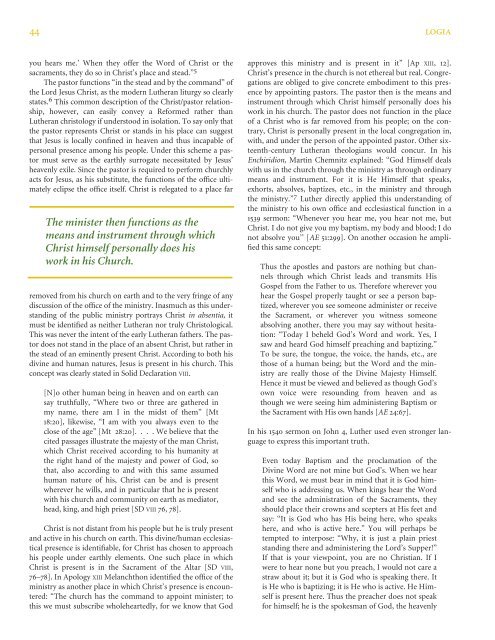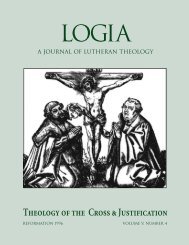03-1 Pastoral Care.pdf
03-1 Pastoral Care.pdf
03-1 Pastoral Care.pdf
- No tags were found...
Create successful ePaper yourself
Turn your PDF publications into a flip-book with our unique Google optimized e-Paper software.
44 LOGIAyou hears me.’ When they offer the Word of Christ or thesacraments, they do so in Christ’s place and stead.” 5The pastor functions “in the stead and by the command” ofthe Lord Jesus Christ, as the modern Lutheran liturgy so clearlystates. 6 This common description of the Christ/pastor relationship,however, can easily convey a Reformed rather thanLutheran christology if understood in isolation. To say only thatthe pastor represents Christ or stands in his place can suggestthat Jesus is locally confined in heaven and thus incapable ofpersonal presence among his people. Under this scheme a pastormust serve as the earthly surrogate necessitated by Jesus’heavenly exile. Since the pastor is required to perform churchlyacts for Jesus, as his substitute, the functions of the office ultimatelyeclipse the office itself. Christ is relegated to a place farThe minister then functions as themeans and instrument through whichChrist himself personally does hiswork in his Church.removed from his church on earth and to the very fringe of anydiscussion of the office of the ministry. Inasmuch as this understandingof the public ministry portrays Christ in absentia, itmust be identified as neither Lutheran nor truly Christological.This was never the intent of the early Lutheran fathers. The pastordoes not stand in the place of an absent Christ, but rather inthe stead of an eminently present Christ. According to both hisdivine and human natures, Jesus is present in his church. Thisconcept was clearly stated in Solid Declaration VIII.[N]o other human being in heaven and on earth cansay truthfully, “Where two or three are gathered inmy name, there am I in the midst of them” [Mt18:20], likewise, “I am with you always even to theclose of the age” [Mt 28:20]. . . . We believe that thecited passages illustrate the majesty of the man Christ,which Christ received according to his humanity atthe right hand of the majesty and power of God, sothat, also according to and with this same assumedhuman nature of his, Christ can be and is presentwherever he wills, and in particular that he is presentwith his church and community on earth as mediator,head, king, and high priest [SD VIII 76, 78].Christ is not distant from his people but he is truly presentand active in his church on earth. This divine/human ecclesiasticalpresence is identifiable, for Christ has chosen to approachhis people under earthly elements. One such place in whichChrist is present is in the Sacrament of the Altar [SD VIII,76–78]. In Apology XIII Melanchthon identified the office of theministry as another place in which Christ’s presence is encountered:“The church has the command to appoint minister; tothis we must subscribe wholeheartedly, for we know that Godapproves this ministry and is present in it” [Ap XIII, 12].Christ’s presence in the church is not ethereal but real. Congregationsare obliged to give concrete embodiment to this presenceby appointing pastors. The pastor then is the means andinstrument through which Christ himself personally does hiswork in his church. The pastor does not function in the placeof a Christ who is far removed from his people; on the contrary,Christ is personally present in the local congregation in,with, and under the person of the appointed pastor. Other sixteenth-centuryLutheran theologians would concur. In hisEnchiridion, Martin Chemnitz explained: “God Himself dealswith us in the church through the ministry as through ordinarymeans and instrument. For it is He Himself that speaks,exhorts, absolves, baptizes, etc., in the ministry and throughthe ministry.” 7 Luther directly applied this understanding ofthe ministry to his own office and ecclesiastical function in a1539 sermon: “Whenever you hear me, you hear not me, butChrist. I do not give you my baptism, my body and blood; I donot absolve you’’ [AE 51:299]. On another occasion he amplifiedthis same concept:Thus the apostles and pastors are nothing but channelsthrough which Christ leads and transmits HisGospel from the Father to us. Therefore wherever youhear the Gospel properly taught or see a person baptized,wherever you see someone administer or receivethe Sacrament, or wherever you witness someoneabsolving another, there you may say without hesitation:“Today I beheld God’s Word and work. Yes, Isaw and heard God himself preaching and baptizing.”To be sure, the tongue, the voice, the hands, etc., arethose of a human being; but the Word and the ministryare really those of the Divine Majesty Himself.Hence it must be viewed and believed as though God’sown voice were resounding from heaven and asthough we were seeing him administering Baptism orthe Sacrament with His own hands [AE 24:67].In his 1540 sermon on John 4, Luther used even stronger languageto express this important truth.Even today Baptism and the proclamation of theDivine Word are not mine but God’s. When we hearthis Word, we must bear in mind that it is God himselfwho is addressing us. When kings hear the Wordand see the administration of the Sacraments, theyshould place their crowns and scepters at His feet andsay: “It is God who has His being here, who speakshere, and who is active here.” You will perhaps betempted to interpose: “Why, it is just a plain prieststanding there and administering the Lord’s Supper!”If that is your viewpoint, you are no Christian. If Iwere to hear none but you preach, I would not care astraw about it; but it is God who is speaking there. Itis He who is baptizing; it is He who is active. He Himselfis present here. Thus the preacher does not speakfor himself; he is the spokesman of God, the heavenly
















